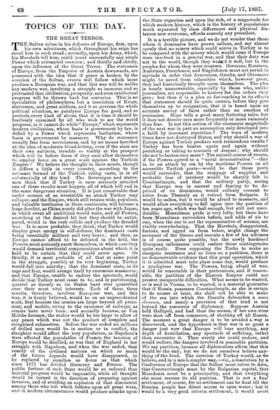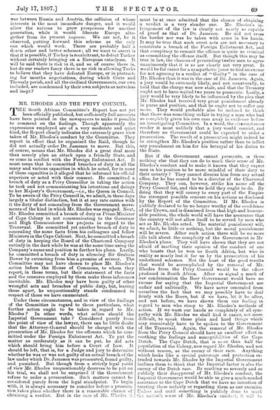TOPICS OF THE DAY.
THE GREAT TERROR. THE Sultan relies in his defiance of Europe, first, upon his own adroitness, which throughout his reign has stood him in such stead ; secondly, upon his Army, which, his Marshals tell him, could resist successfully any single Power which attempted coercion ; and thirdly and chiefly, upon the influence of the Great Terror. The statesmen of Europe, from the Emperor of Austria downwards, are possessed with the idea that if peace is broken by the coercion of the Sultan, events will follow which must produce a European war, and that this war will be unlike any modern war, involving a struggle so immense and so protracted that civilisation, prosperity, and even intellectual progress will be thrown back for centuries. This is no speculation of philosophers, but a conviction of Kings, statesmen, and great soldiers, and it so governs the whole political situation, so paralyses Earope for good, and so protects every kind of abuse, that it is time it should be fearlessly examined by all who wish to see the world progress, as it cannot do while" Europe," which represents modern civilisation, whose basis is government by law, is defied by a Power which represents barbarism, whose basis is government by massacre. Why do statesmen usually free from nervousness, and by no means horrified at the idea of moderate blood-letting, even if the slain are their own subjects, tremble so visibly at the prospect which will lie before them if they once allow themselves to employ force on a great scale against the Turkish Empire ? We believe the thought in their minds, though it differs a little in every country, according to the estimate formed of the Turkish ruling caste, is in all substantially of this kind. The Sovereigns and states- men think that if Turkey is once seriously attacked one of three results must happen, all of which will end in the same dangerous situation. It is just conceivable that under menace of so irresistible an attack Turkey may collapse, and the Empire, which still retains wide, populous, and valuable territories in three continents, will become a huge derelict, as China nearly did after the war with Japan, in which event all ambitions would wake, and all Powers, snatching at the desired bit lest they should be antici- pated, would in the rush collide and produce the dreaded war. It is more probable, they think, that Turkey would display great energy in self-defence, the dominant caste being essentially military and very brave ; and then, as Europe cannot afford to be defeated in the field, the Powers must seriously exert themselves, in which case they would demand territorial compensations about which it is held to be certain that they could never agree. Or thirdly, it is most probable of all that at some point in the struggle, possibly at its very beginning, Turkey would fall into anarchy; that the dominant caste, in its rage and fear, would avenge itself by enormous massacres ; and that Europe, unable to endure the spectacle, would decide that Turkey must cease to be, and in partitioning, quarrel as fiercely as its States have ever quarrelled over their most vital interests. Each of these three results, therefore, involves European war, and this war, it is firmly believed, would be on an unprecedented scale, first because the armies are large beyond all prece- dent, and mobile, owing to the existence of railways, as armies have never been ; and secondly because, as Von Moltke foresaw, the stakes would be too large to allow of any peace which was not the product of complete and recognised exhaustion. Before the war ended six millions of drilled men would be in motion or in conflict, the slaughter would affect the very population, as Napoleon's wars affected the population of France, the taxation of Europe would be doubled, as was that of England in her struggle with Napoleon, and when the war ended, that comity of the civilised nations on which so much of the future depends would have disappeared, to be replaced by enmities as fierce as that which since 1871 has divided Germany and France. The public fortune of each State would be so reduced that material progress would be impossible, while all thought would be turned in the direction of preparing against invasion, and of avoiding an explosion of that discontent among those who toil which follows upon all great wars, and in modern circumstances would produce attacks upon the State organism and upon the rich, of a magnitude for which modern history, which is the history of populations much separated by class differences and physical dis- tances now overcome, affords scarcely any precedent.
It is a terrible picture, and we do not wonder that those whom it dominates have grown callous, and say almost openly that no misery which could arrive in Turkey is to be compared with the misery which would come if Europe were involved in a general war, and that their duty was not to the world, though they wished it well, but to the peoples for whom they were trustees. Germans, Russians, Austrians, Frenchmen, and Englishmen must not perish in myriads in order that Armenians, Greeks, and Ottomans might be saved from calamities which, however great, they had historically brought upon themselves. The plea is nearly unanswerable, especially by those who, unlike journalists, are responsible to history for the orders they give ; but then it is a plea so far-reaching in its effects that statesmen should be quite certain, before they give themselves up to resignation, that it is based upon an accurate survey of facts rather than an emotion of pessimism. Hope tells a good many flattering tales, but it does not deceive men more frequently or more ruinously than fear. Is not this notion of the enormous magnitude of the next war in part an assumption only developed into a faith by incessant repetition ? The wars of modern times have not destroyed States, and why should a war of Europe against Turkey produce such tremendous results ? Turkey has been beaten again and again without perishing or taking to counsels of despair ; why should she not be beaten once more ? The natural course of events, if the Powers agreed to a "naval demonstration "—that is, to an attack by sea by the maritime Powers on all accessible Turkish ports—would be that those ports would surrender, that the stoppage of supplies and probable loss of territory would be sharply felt in Constantinople, and that the military party, seeing that Europe was in earnest and fearing to be de- prived of its dominions, would sullenly consent to retire from Thessaly as it retired from Bulgaria. It would be sullen, but it would be afraid to massacre, and would allow everything to fall again into the position of ten years ago, which was bad enough, but still not unen- durable. Mussulman pride is very lofty, but there have been Mussulman surrenders before, and odds of six to one, when the one is not the representative of science, are visibly overwhelming. That the Marshals, disappointed, furious, and egged on from below, might change the occupant of the throne and execute a few of his advisers is of course quite possible, but the newly hardened European callousness could endure those contingencies quite easily. Even supposing the Turks to make an energetic resistance and so force on a partition, there is no demonstrable evidence that this great operation, which it is admitted must take place some day, would produce a prodigious war. The Powers, being afraid of war, would be reasonable in their pretensions, and if reason- able, the partition of the Eastern Empire could not present insuperable difficulties. What seems to be wanted, or is said in Vienna to be wanted, is a material guarantee that if Russia possesses Constantinople, as she is certain to do sooner or later, she shall not be able to make of the sea into which the Danube debouches a mare elausum, and surely a • provision of that kind is not beyond the resources of diplomacy. Suppose Austria held Gallipoli, and had thus the means, if her own river were shut off from commerce, of shutting off all Russia. The moment a great danger is to be avoided a way is discovered, and the hypothesis is that war is so great a danger just now that Europe will bear anything, any depth of humiliation, any spectacle of suffering, rather than encounter it. Then surely she could endure, and would endure, the dangers involved in peaceable partition. We say partition, because all diplomatists affirm that this would be the end ; but we do not ourselves believe any- thing of the kind. The coercion of Turkey would, as we believe, end in a much simpler way,—viz., a resolution by a Conference of Europe that the Sultan must retire to Asia, that Constantinople must be the Bulgarian capital, that Macedonia must be a principality, and that everything else must resume its old position. That is not a final settlement, of course, for no settlement can be final till the Russian people has direct access to open water ; but it would be a very good interim settlement, it would avert war between Russia and Austria, the collision of whose interests is the most immediate danger, and it would allow the nations to grow prosperous for another generation, while it would liberate Europe alto- gether from its present impasse. We are not, be it observed, putting forward this scheme as the only one which would work. There are probably halt a dozen other and better schemes ; all we want to assert is that it is possible, if Turkey is recalcitrant, to defeat Turkey without certainly bringing on a European cataclysm. It will be said there is risk in it, and so of course there is, but do our readers fancy there is no risk in allowing Turks to believe that they have defeated Europe, or in protract- ing for months negotiations, during which Crete and Thessaly perish, and all the civilised Governments, our own included, are condemned by their own subjects as nerveless and inept?



































 Previous page
Previous page